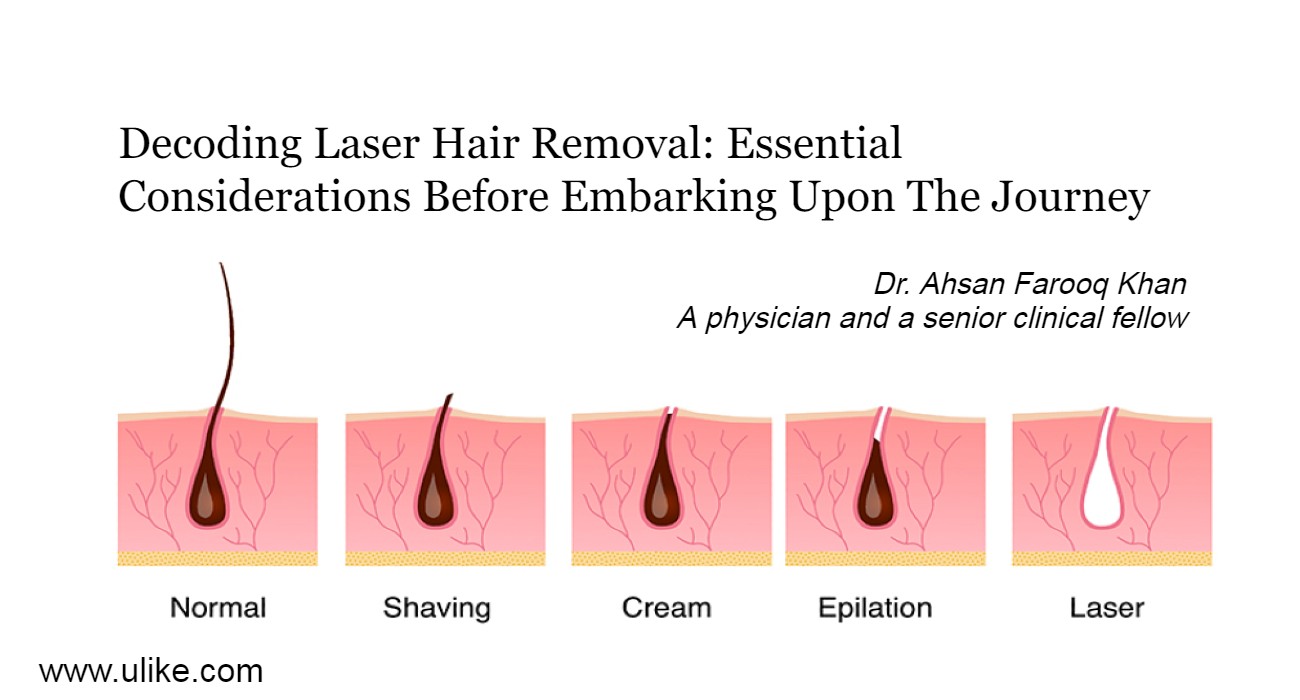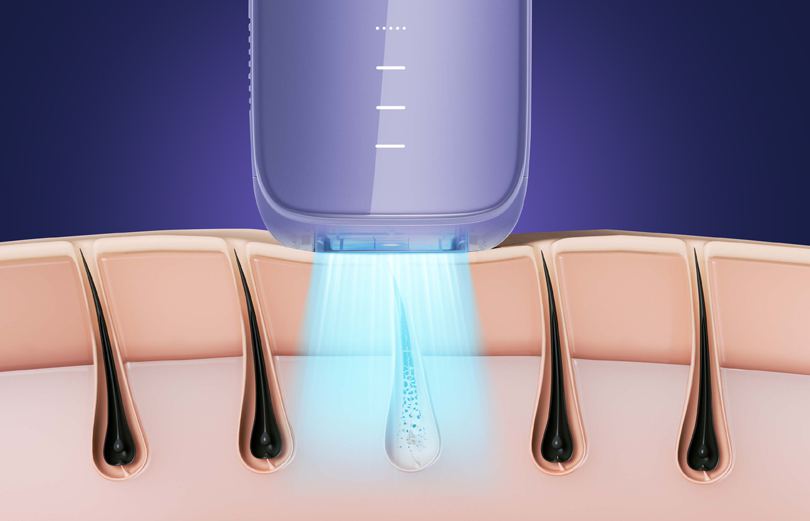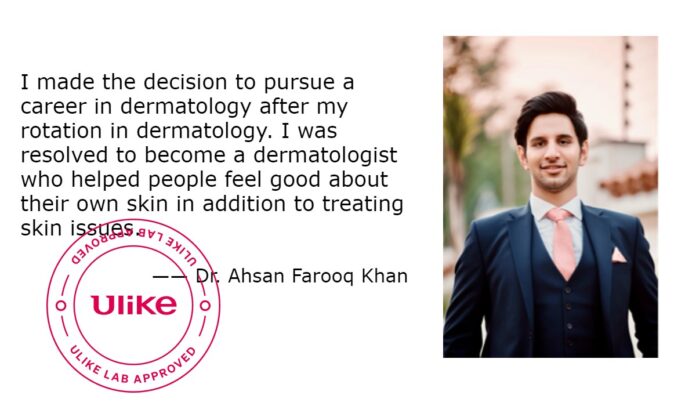Embarking on the journey of laser hair removal is a decision that requires careful consideration and a thorough understanding of the procedure. As a seasoned dermatologist with extensive experience in utilizing various laser hair removal devices and conducting numerous procedures, I am well aware of the questions and concerns that often arise among the general public. In this comprehensive guide, we will delve into the key aspects every individual should know before trying laser hair removal, drawing insights from reputable sources such as the American Academy of Dermatology. [1]
What is Laser Hair Removal?
The first step to decoding laser is understanding what it is all about. Therefore, it is essential to have a basic understanding of what we will delve into in this article. LASER is an abbreviation of Light Amplification with Stimulated Emission of Radiation. This gives us an idea about its basic principle as well. It works by various principles on the skin. For instance, in the case of hair removal, laser beams act on a certain wavelength and target the hair follicles by emitting a light that is absorbed by the pigment called melanin in the hair. This light energy is then converted into heat, which, in turn, damage or burn the hair follicles slowing down hair growth in the future and consequently leading to significant hair reduction over a period of a certain time.
Lasers are widely used by practicing dermatologists all across the world as it is used for a myriad of purposes. It is commonly used for hair removal, scar and skin rejuvenation, tattoo removal and mole removal to mention a few.
In this article, we will be discussing laser hair removal and its aftercare.
During the procedure, highly concentrated beams of light are directed at hair follicles because laser acts on the hair follicle gradually burning the roots and eventually slowing down the growth of the hair cycle in progressive sessions resulting in considerable hair reduction. The pigment in the hair follicles absorbs the light, ultimately destroying the hair. While the process is effective, it requires careful post-treatment care to optimize results and minimize the potential side effects.[2]
1. Safety and Efficacy
Laser hair removal is a safe and effective method for semi-long-lasting hair reduction. However, it’s crucial to choose a qualified and experienced professional to ensure optimal results and minimize potential risks. Always seek a reputable clinic with trained dermatologists and certified technicians who have considerable experience and are fully equipped to handle laser machines.
2. Skin and Hair Type
Different skin and hair types respond differently to laser treatment. Individuals with fair skin and dark hair typically see the best results, as the laser targets the pigment in the hair follicle. However, advancements in technology have made laser hair removal more accessible to a broader range of skin and hair colors.
3. Patience is a Virtue
Laser hair removal is not a one-time solution. It requires multiple sessions to achieve the desired results. The hair growth cycle involves various phases, and the laser is most effective during the active growth phase. Laser does not burn or finish the hair in one session. The function is to target the chromophore ( a chromophore is a material or a pigment present inside a tissue that absorbs a particular wavelength and in the case of hair, the pigment is melanin). Multiple laser sessions ensure that all hair follicles are treated during their growth phase if they are placed at regular intervals. Therefore, it is imperative to know that it is a time-consuming process and results vary from one person to another.
4. Preparation is Key
Preparing your skin for laser hair removal is crucial for both safety and effectiveness. Avoid sun exposure and tanning for at least six weeks before the procedure, as tanned skin increases the risk of complications. Additionally, discontinue waxing, plucking, bleaching or electrolysis at least six weeks before treatment, as the laser targets the hair roots, which these methods temporarily remove. If you are using peeling agents such as glycolic acid or salicylic acid-based products or you are using retinol serum or retinoids, kindly discontinue using them as well at least one to two weeks prior to opting for laser as they can be a cause of severe irritation to the skin especially after the procedure.
5. Shave, Don’t Wax or Bleach!
While it is important to refrain from waxing before laser hair removal, shaving is permissible and, in fact, recommended. Shaving the treatment area a day or two before the procedure ensures that the laser energy is focused on the hair follicles rather than the visible hair on the skin’s surface. Secondly, bleaching the hair will hamper the efficacy of laser a great deal because laser preferably works on thick and dark hair shafts and it does not work or has very minimal effect on peach fuzz and extremely fine hair. Bleaching the hair will make it lose its color and the laser will not be able to target it, thereby making your session of minimal or no use.

Addressing Frequently Asked Questions (FAQs):
1. Does It Hurt?
Pain tolerance varies among individuals, but most people describe the sensation as a mild discomfort similar to the snap of a rubber band. Modern laser devices often come equipped with cooling mechanisms to enhance patient comfort and cause minimal or no pain.
2. Are There Any Side Effects?
Temporary side effects may include erythema (redness) and edema (swelling), akin to a mild sunburn. These usually subside within a few hours to a day. Serious side effects are rare when the procedure is performed by a qualified professional.
3. Is It Long-lasting?
While laser hair removal offers long-term hair reduction, it’s not entirely long-lasting. Maintenance sessions may be required to address any hair regrowth over time.
4. Can It Be Done Anywhere on the Body?
Yes, laser hair removal can be performed on various body areas, including the face, legs, arms, bikini line, and more. However, certain areas may be more sensitive, and the expertise of the practitioner is crucial for safe and effective treatment.
5. Can I Go Back to Work Immediately After?
Yes, there is no downtime associated with laser hair removal. Patients can resume their regular activities immediately, but it’s essential to follow post-procedure care instructions provided by the dermatologist.
6. Is It Safe for All Skin Types?
Advancements in laser technology have made the procedure safe for a broader range of skin types. However, individuals with darker skin tones should seek dermatologists experienced in treating diverse skin types to minimize the risk of pigmentation after the procedure
7. What Results Can I Expect?
While results vary, many individuals experience a significant reduction in hair growth after a series of sessions. The treated hair often becomes finer and lighter in colour. As previously described, do not expect the results in the very first or initial sessions. It takes around four to five sessions for the results to become evident.

Conclusion
Laser hair removal can be a transformative and confidence-boosting experience when approached with the right knowledge and preparation. As a dermatologist deeply invested in the well-being of my patients, I emphasize the importance of choosing a reputable clinic with an experienced dermatologist who has considerable expertise in dealing with laser devices, understanding the procedure, and following pre-treatment guidelines. By addressing common FAQs and drawing from reputable sources, I hope that I was able to guide individuals through the essential considerations before stepping into the realm of laser hair removal, ensuring a smooth and successful experience.
Reference
[1] LASER HAIR REMOVAL: FAQS. www.aad.org
[2] Laser hair removal. www.mayoclinic.org

 By Ahsan Farooq Khan
By Ahsan Farooq Khan







